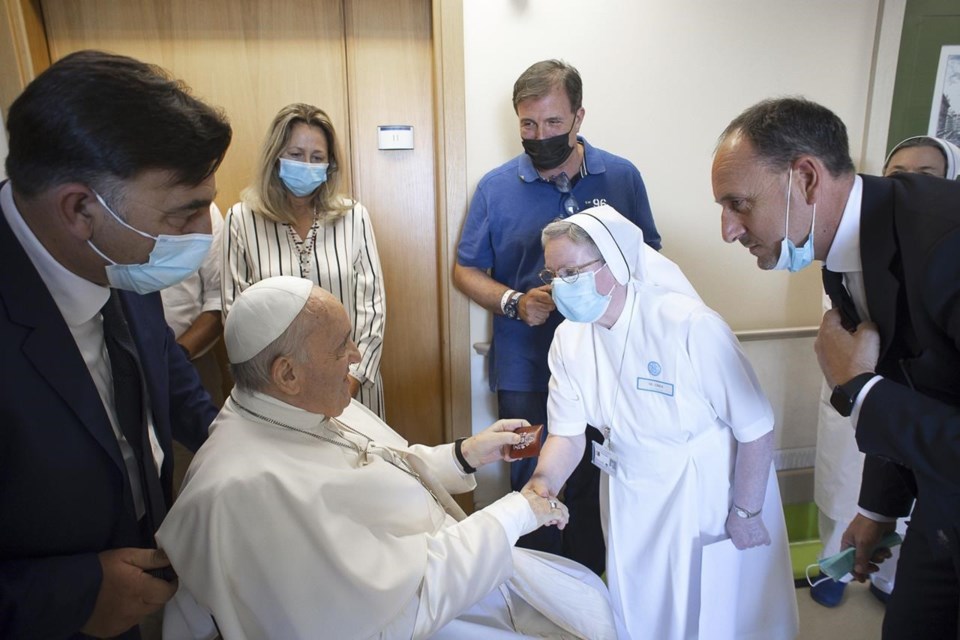LONDON (AP) — Pope Francis emerged from a three-hour abdominal surgery at a Rome hospital on Wednesday evening, with no known complications, the Vatican said. The procedure was necessary to repair a painful hernia the pontiff developed, linked to a 2021 operation to remove a significant portion of his large intestine.
Here's a look at what we know about the operation and what potential complications doctors will be watching for in the 86-year-old pontiff.
WHAT KIND OF SURGERY DID THE POPE HAVE?
Pope Francis had a laparotomy, a surgery that involves opening up the abdomen, and doctors also inserted some prosthetic mesh to strengthen his colon.
“The surgery and general anesthesia were carried out without complications,” the Vatican said in a statement. Authorities said Francis was alert and responsive and that he had “responded well.”
Doctors not linked to the pope's care said hernias were a known risk after previous operations and typically only become problematic when patients develop a bulge in their abdomen and experience significant pain. In such cases, surgery is needed to repair the hernia, which may involve some of the patient's bowel.
The Vatican said Francis had been in increasing pain.
Dr. Walter Longo, chief of colon and rectal surgery at Yale University School of Medicine, said leaving the pope's hernia untreated could lead to severe bowel problems.
“When you're older and not in great shape, you can get a hernia through the (surgical) incision,” he said. That could result in twisted intestines that cut off the blood supply to the bowel, ultimately leading to gangrene, if not addressed.
“They have to fix it, there's no other option,” Longo said.
Dr. Manish Chand, a British colorectal surgeon, said the addition of a mesh prosthesis should significantly reduce the chances that the Pope would need further surgeries.
“The mesh is there to reinforce that area so this problem doesn't happen again in the future," Chand explained.
WHAT OTHER COMPLICATIONS ARE POSSIBLE?
Francis had 33 centimeters (13 inches) of his large intestine removed two years ago. He was hospitalized earlier this year for bronchitis, and lost part of one lung decades ago.
The Vatican said the pope's operation Wednesday took three hours, considerably longer than the standard 60 to 90 minutes doctors say the operation usually takes.
Spending more time under anesthesia, coupled with being on a ventilator for so long — in someone who has lost part of one lung as a young man — could put the pontiff at risk of breathing complications or a longer-than-expected recovery time.
Doctors noted that patients older than 80 are often more susceptible to complications after general anesthesia and said the team treating the pope at Rome's Gemelli hospital would be monitoring him for problems such as stroke, heart issues, kidney failure and pneumonia.
“When you operate on older people and they’re frail and fragile, they’re not as peppy as they once were,” Longo said. “But if he gets through the operation and does fine, he should be OK.”
Dr. Robin Phillips, an emeritus professor of colorectal surgery at Imperial College London, said abdominal surgery can also compromise lung function.
“I suspect they are doing it now because they are worried it might become more complicated and result in an emergency operation which would carry an even bigger risk than leaving it alone or operating now,” Phillips said.
HOW LONG WILL IT TAKE THE POPE TO RECOVER?
In a best-case scenario, probably at least six weeks. Chand described the procedure as “straightforward” and said most patients are discharged from the hospital within about a week.
How long it takes the pope to resume his normal duties will depend on his doctors' ability to manage his pain. The chances of a recurrence are also highest within the first six weeks, Chand said.
Longo, of Yale University, said the pope's age and frailty might mean a longer recovery time and that he might not be fit to travel for one to two months. The pope has used a wheelchair and walker for more than a year and has a busy August on his schedule, with trips planned to Portugal and Mongolia.
Dr. Sergio Alfieri, who performed the pope's procedure on Wednesday, said the internal scarring causing Francis abdominal pain in recent months was removed. The Vatican said the pope would remain at the hospital for “several days.”
Dr. P. Ravi Kiran, chief of colorectal surgery at Columbia University, said it would take a few days for Francis' bowels to start working again and for him to recover from the effects of anesthesia.
Kiran recommended the pope stick to a healthy diet with lots of fiber but did not anticipate any major changes to the pontiff's lifestyle following his surgery.
“Any weakness in his abdominal wall ... (,) provided it's fixed securely, shouldn't be a problem,” Kiran said. “I'm really wishing the pope a speedy recovery.”
Maria Cheng, The Associated Press



